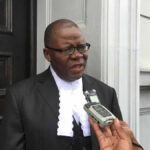The trial of jailed businessmen Moses Mpofu and Mike Chimombe commenced on Wednesday before High Court judge, Justice Pisirayi Kwenda, amidst a flurry of legal challenges and accusations of selective prosecution.
The two men, who have spent months in pre-trial detention, claim their prosecution is politically motivated, a punishment for allegedly leaking damaging audio recordings implicating prominent figures.
The trial’s opening day was marked by tension, culminating in the judge threatening to take action against Mpofu’s lawyer, Tapson Dzvetero, for attempting to amend his client’s defence outline at the eleventh hour.
Dzvetero sought to introduce constitutional arguments and other issues that arose just before the trial began, prompting several reminders from the judge regarding his authority over the proceedings.
Mpofu, through his lawyer, vehemently denied all charges. His defence strategy hinges on a challenge to the Magistrates Court’s decision regarding his bail and detention, arguing a violation of his constitutional rights.
Specifically, he contends that the charges related to failing to supply goats as per a contract with the Ministry of Lands, Agriculture, Water, Fisheries and Rural Development, amount to unlawful imprisonment for breach of contract, contravening section 49 (2) of the Constitution.
Mpofu’s legal team wants the Constitutional Court to determine whether his prosecution is indeed selective and punitive, a violation of his right to equal protection under the law (section 56 (1) of the Constitution). He explicitly denies making any misrepresentations to the ministry.
“He neither made any misrepresentation personally nor in common purpose with anyone to Ministry of Lands, Agriculture, Water, Fisheries and Rural Development, he never harboured any intention to deceive the said Ministry nor did he ever realise that there was real risk or possibility of deceiving it or to cause the Ministry to act upon any such alleged misrepresentation to the prejudice of the Ministry.
“He denies ever making any misrepresentation to the Ministry of Lands, Agriculture, Water, Fisheries and Rural Development in any tender documents. He never made any representations to the effect that a company called Blackdeck Livestock Poultry and Farming was a registered company in Zimbabwe with a valid Tax Clearance Certificate and a valid NSSA compliance certificate,” stated Dzvetero.
Chimombe, represented by lawyer Ashiel Mugiya, also pleaded not guilty, asserting complete lack of involvement with Black Deck Livestock Poultry and Farming. His defence rests on the argument that the state has failed to establish any link between him and the alleged offences. Mugiya argued that the doctrine of common purpose, used by the state to implicate Chimombe, is inapplicable in this case.
He highlighted the lack of evidence connecting Chimombe to the forged documents, the bid submitted by Black Deck, or the contract with the Ministry. Mugiya detailed Chimombe’s lack of involvement in the various stages of the alleged crime.
“Chimombe will say that the doctrine of common purpose which the State seeks to invoke in attaching liability to him does not apply in the circumstances, the state has not shown how he is associated with the alleged forged documents, it has not shown how he is associated with the Bid submitted by Black deck (Pvt) Ltd or by the alleged unregistered entity, there is no connection between his actions and that of his alleged accomplice between the time that the bid documents were prepared and the time upon which the contract was then effectively entered into.
“Under the doctrine of common purpose it is not enough to simply allege in state papers both charge shit and summary of the state case that both accused person in connivance did this, it must be clear from the onset what each accused person did, it must be clear that the foot prints of each and one of them can be ascertained from the whole crime scene or plot and it must be made clear that each accused person was aware of what the other one was doing in order to achieve their common objective it is only under these circumstances that the doctrine can be applied.”
Mugiya said Chimombe has no knowledge on how Black deck (Pvt) Ltd prepared its documents drew then up and submitted the bid, he has no knowledge on how the contract between the Ministry of Lands and Blackdeck.
“He was nowhere near when the agreement was entered into, he was not present when the goats were supplied to the Ministry by Black deck (Pvt) Itd, he never received any money from Black deck (Pvt) Itd which were party of the proceeds from what was paid by the Ministry.
“The only time that he recalls is when he attended a meeting at the Ministry of Lands after a dispute had already arisen between Blackdeck (Pvt) Ltd and the Ministry he did so in his capacity as the Chairperson of a local pressure group called Economic Empowerment Group (EEG) which advocates for amongst other things that governments prioritize local companies when entering into agreements for the supply of good and services. The meeting was way after the alleged offense had been committed and he was simply trying in that capacity for the two parties to find each other,” Mugiya said.
Adding another layer of complexity to the proceedings, Lovemore Madhuku, instructing for Mugiya, expressed dissatisfaction with the court’s composition, questioning the assessors’ ages in relation to the mandatory retirement age for judges. He argued that this potentially impacts the trial’s legitimacy and called for a review of the bench’s composition before the trial could proceed.
“We cannot go into a trial before a thing which is not a court. We certainly wish to challenge the composition of the bench. We will only plead so that we can start. But we take the view that in terms of the Constitution the position that the mandatory age of the judge should be 70. If it applies to judge it surely applies to assessors. This is an important criminal trial and it should start correctly,” said Madhuku.
The court is expected to address these constitutional issues over the next two days before deciding whether the trial will proceed or be referred to the Constitutional Court. The case of Mpofu and Chimombe highlights the intersection of business dealings, political intrigue, and the complexities of Zimbabwean law, leaving the question of selective prosecution versus justice served hanging in the balance.
The outcome will undoubtedly have significant implications for the ongoing debate surrounding transparency and accountability within the country’s political and economic spheres.












